Ethics in Healthcare: Reflective Analysis of Laws and Decision Making
VerifiedAdded on 2023/06/04
|9
|2235
|329
Essay
AI Summary
This essay provides a reflective analysis of ethics in healthcare, emphasizing the importance of ethics, laws, and professional codes in shaping healthcare practices. It discusses the influence of ethics and laws on personal practice as a healthcare provider, highlighting the significance of ethical guidelines and legal frameworks in ensuring quality patient care. The essay further explores clinical and administrative ethics, detailing their respective roles in maintaining ethical standards within healthcare institutions. It also examines the impact of professional codes, values, and legislation on ethical decision-making, underscoring the need for healthcare professionals to adhere to ethical principles and legal requirements in their practice. The essay concludes by reinforcing the positive impact of ethics and laws on the author's profession as a healthcare worker, emphasizing the importance of upholding ethical standards and legal obligations in providing patient-centered care.

Reflective Style Writing
Paraphrase This Document
Need a fresh take? Get an instant paraphrase of this document with our AI Paraphraser
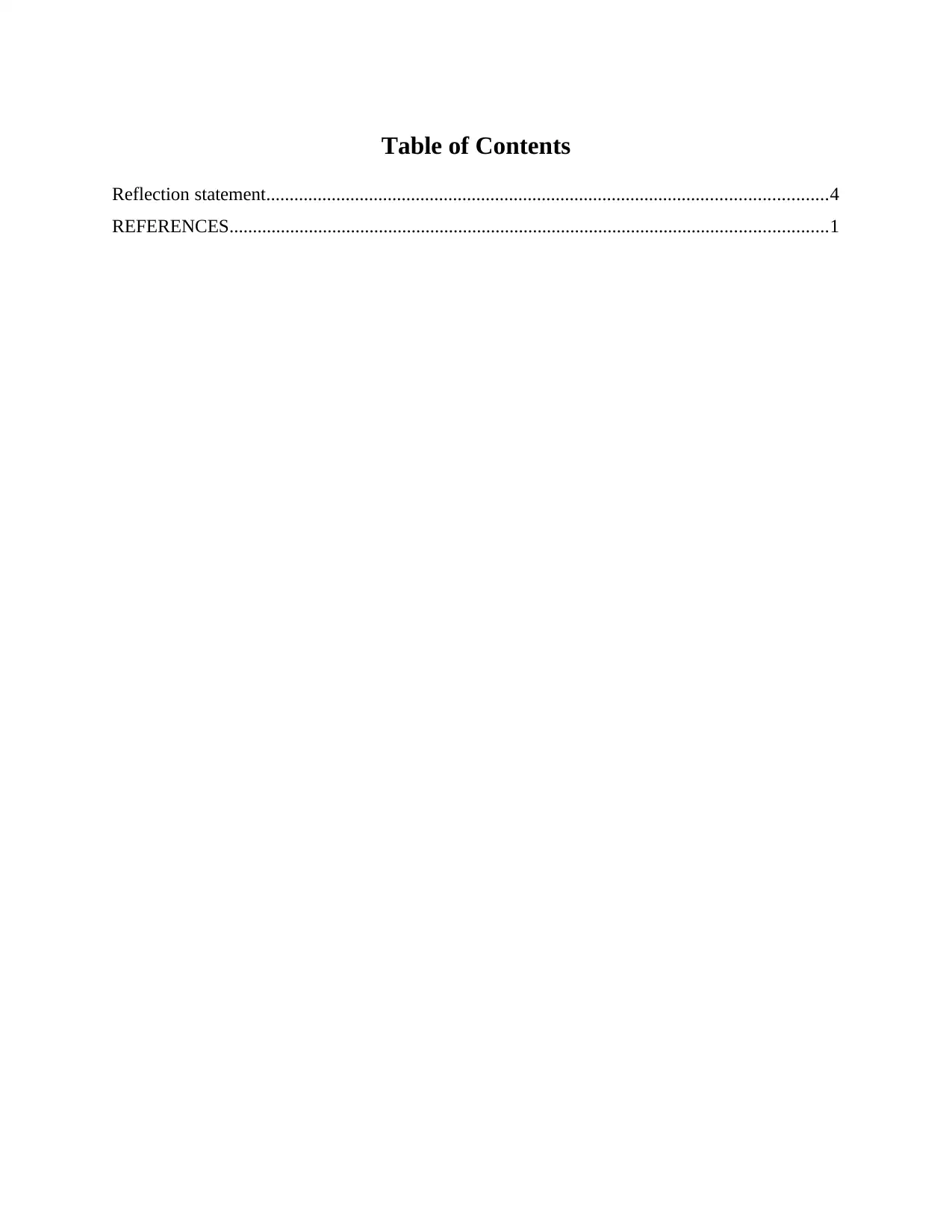
Table of Contents
Reflection statement........................................................................................................................4
REFERENCES................................................................................................................................1
Reflection statement........................................................................................................................4
REFERENCES................................................................................................................................1
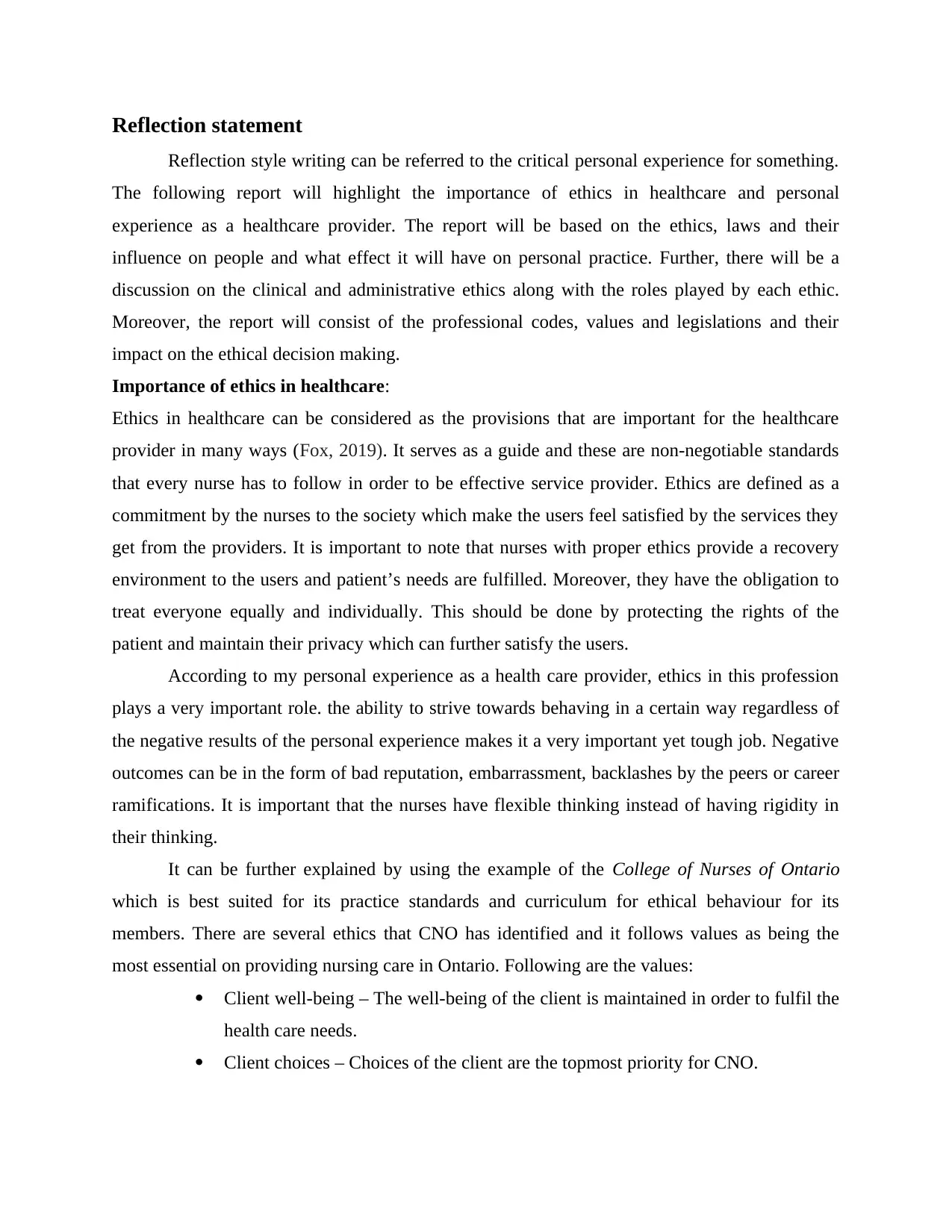
Reflection statement
Reflection style writing can be referred to the critical personal experience for something.
The following report will highlight the importance of ethics in healthcare and personal
experience as a healthcare provider. The report will be based on the ethics, laws and their
influence on people and what effect it will have on personal practice. Further, there will be a
discussion on the clinical and administrative ethics along with the roles played by each ethic.
Moreover, the report will consist of the professional codes, values and legislations and their
impact on the ethical decision making.
Importance of ethics in healthcare:
Ethics in healthcare can be considered as the provisions that are important for the healthcare
provider in many ways (Fox, 2019). It serves as a guide and these are non-negotiable standards
that every nurse has to follow in order to be effective service provider. Ethics are defined as a
commitment by the nurses to the society which make the users feel satisfied by the services they
get from the providers. It is important to note that nurses with proper ethics provide a recovery
environment to the users and patient’s needs are fulfilled. Moreover, they have the obligation to
treat everyone equally and individually. This should be done by protecting the rights of the
patient and maintain their privacy which can further satisfy the users.
According to my personal experience as a health care provider, ethics in this profession
plays a very important role. the ability to strive towards behaving in a certain way regardless of
the negative results of the personal experience makes it a very important yet tough job. Negative
outcomes can be in the form of bad reputation, embarrassment, backlashes by the peers or career
ramifications. It is important that the nurses have flexible thinking instead of having rigidity in
their thinking.
It can be further explained by using the example of the College of Nurses of Ontario
which is best suited for its practice standards and curriculum for ethical behaviour for its
members. There are several ethics that CNO has identified and it follows values as being the
most essential on providing nursing care in Ontario. Following are the values:
Client well-being – The well-being of the client is maintained in order to fulfil the
health care needs.
Client choices – Choices of the client are the topmost priority for CNO.
Reflection style writing can be referred to the critical personal experience for something.
The following report will highlight the importance of ethics in healthcare and personal
experience as a healthcare provider. The report will be based on the ethics, laws and their
influence on people and what effect it will have on personal practice. Further, there will be a
discussion on the clinical and administrative ethics along with the roles played by each ethic.
Moreover, the report will consist of the professional codes, values and legislations and their
impact on the ethical decision making.
Importance of ethics in healthcare:
Ethics in healthcare can be considered as the provisions that are important for the healthcare
provider in many ways (Fox, 2019). It serves as a guide and these are non-negotiable standards
that every nurse has to follow in order to be effective service provider. Ethics are defined as a
commitment by the nurses to the society which make the users feel satisfied by the services they
get from the providers. It is important to note that nurses with proper ethics provide a recovery
environment to the users and patient’s needs are fulfilled. Moreover, they have the obligation to
treat everyone equally and individually. This should be done by protecting the rights of the
patient and maintain their privacy which can further satisfy the users.
According to my personal experience as a health care provider, ethics in this profession
plays a very important role. the ability to strive towards behaving in a certain way regardless of
the negative results of the personal experience makes it a very important yet tough job. Negative
outcomes can be in the form of bad reputation, embarrassment, backlashes by the peers or career
ramifications. It is important that the nurses have flexible thinking instead of having rigidity in
their thinking.
It can be further explained by using the example of the College of Nurses of Ontario
which is best suited for its practice standards and curriculum for ethical behaviour for its
members. There are several ethics that CNO has identified and it follows values as being the
most essential on providing nursing care in Ontario. Following are the values:
Client well-being – The well-being of the client is maintained in order to fulfil the
health care needs.
Client choices – Choices of the client are the topmost priority for CNO.
⊘ This is a preview!⊘
Do you want full access?
Subscribe today to unlock all pages.

Trusted by 1+ million students worldwide
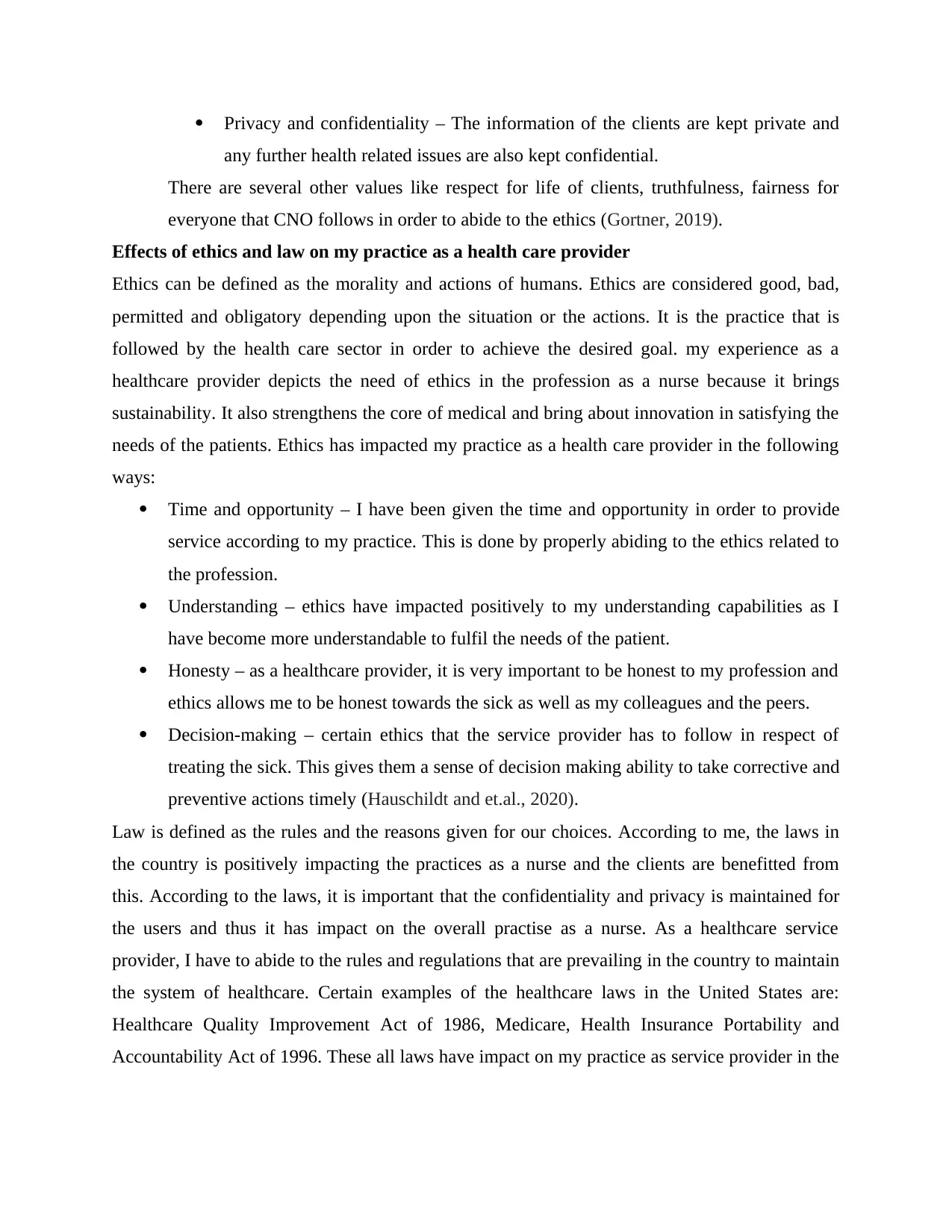
Privacy and confidentiality – The information of the clients are kept private and
any further health related issues are also kept confidential.
There are several other values like respect for life of clients, truthfulness, fairness for
everyone that CNO follows in order to abide to the ethics (Gortner, 2019).
Effects of ethics and law on my practice as a health care provider
Ethics can be defined as the morality and actions of humans. Ethics are considered good, bad,
permitted and obligatory depending upon the situation or the actions. It is the practice that is
followed by the health care sector in order to achieve the desired goal. my experience as a
healthcare provider depicts the need of ethics in the profession as a nurse because it brings
sustainability. It also strengthens the core of medical and bring about innovation in satisfying the
needs of the patients. Ethics has impacted my practice as a health care provider in the following
ways:
Time and opportunity – I have been given the time and opportunity in order to provide
service according to my practice. This is done by properly abiding to the ethics related to
the profession.
Understanding – ethics have impacted positively to my understanding capabilities as I
have become more understandable to fulfil the needs of the patient.
Honesty – as a healthcare provider, it is very important to be honest to my profession and
ethics allows me to be honest towards the sick as well as my colleagues and the peers.
Decision-making – certain ethics that the service provider has to follow in respect of
treating the sick. This gives them a sense of decision making ability to take corrective and
preventive actions timely (Hauschildt and et.al., 2020).
Law is defined as the rules and the reasons given for our choices. According to me, the laws in
the country is positively impacting the practices as a nurse and the clients are benefitted from
this. According to the laws, it is important that the confidentiality and privacy is maintained for
the users and thus it has impact on the overall practise as a nurse. As a healthcare service
provider, I have to abide to the rules and regulations that are prevailing in the country to maintain
the system of healthcare. Certain examples of the healthcare laws in the United States are:
Healthcare Quality Improvement Act of 1986, Medicare, Health Insurance Portability and
Accountability Act of 1996. These all laws have impact on my practice as service provider in the
any further health related issues are also kept confidential.
There are several other values like respect for life of clients, truthfulness, fairness for
everyone that CNO follows in order to abide to the ethics (Gortner, 2019).
Effects of ethics and law on my practice as a health care provider
Ethics can be defined as the morality and actions of humans. Ethics are considered good, bad,
permitted and obligatory depending upon the situation or the actions. It is the practice that is
followed by the health care sector in order to achieve the desired goal. my experience as a
healthcare provider depicts the need of ethics in the profession as a nurse because it brings
sustainability. It also strengthens the core of medical and bring about innovation in satisfying the
needs of the patients. Ethics has impacted my practice as a health care provider in the following
ways:
Time and opportunity – I have been given the time and opportunity in order to provide
service according to my practice. This is done by properly abiding to the ethics related to
the profession.
Understanding – ethics have impacted positively to my understanding capabilities as I
have become more understandable to fulfil the needs of the patient.
Honesty – as a healthcare provider, it is very important to be honest to my profession and
ethics allows me to be honest towards the sick as well as my colleagues and the peers.
Decision-making – certain ethics that the service provider has to follow in respect of
treating the sick. This gives them a sense of decision making ability to take corrective and
preventive actions timely (Hauschildt and et.al., 2020).
Law is defined as the rules and the reasons given for our choices. According to me, the laws in
the country is positively impacting the practices as a nurse and the clients are benefitted from
this. According to the laws, it is important that the confidentiality and privacy is maintained for
the users and thus it has impact on the overall practise as a nurse. As a healthcare service
provider, I have to abide to the rules and regulations that are prevailing in the country to maintain
the system of healthcare. Certain examples of the healthcare laws in the United States are:
Healthcare Quality Improvement Act of 1986, Medicare, Health Insurance Portability and
Accountability Act of 1996. These all laws have impact on my practice as service provider in the
Paraphrase This Document
Need a fresh take? Get an instant paraphrase of this document with our AI Paraphraser
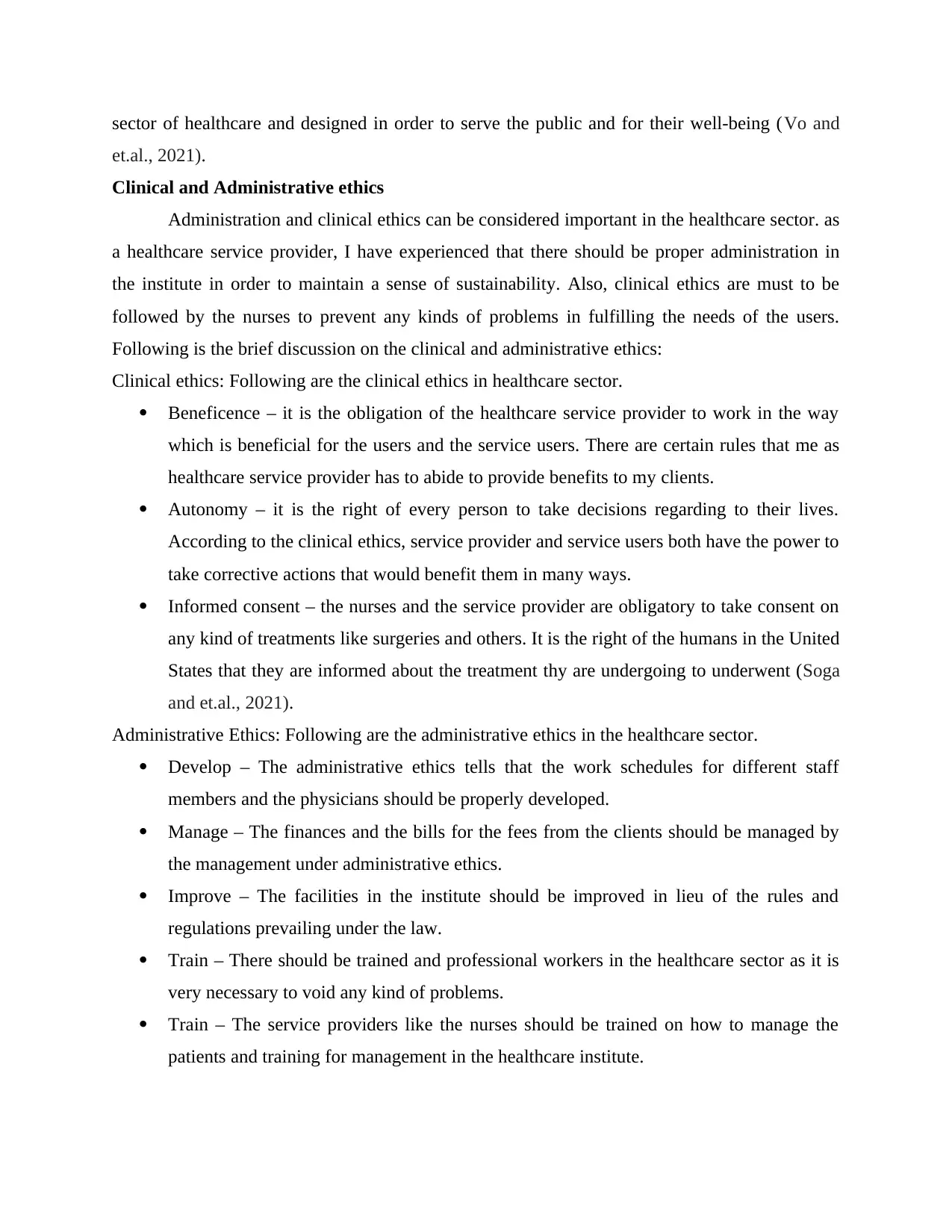
sector of healthcare and designed in order to serve the public and for their well-being (Vo and
et.al., 2021).
Clinical and Administrative ethics
Administration and clinical ethics can be considered important in the healthcare sector. as
a healthcare service provider, I have experienced that there should be proper administration in
the institute in order to maintain a sense of sustainability. Also, clinical ethics are must to be
followed by the nurses to prevent any kinds of problems in fulfilling the needs of the users.
Following is the brief discussion on the clinical and administrative ethics:
Clinical ethics: Following are the clinical ethics in healthcare sector.
Beneficence – it is the obligation of the healthcare service provider to work in the way
which is beneficial for the users and the service users. There are certain rules that me as
healthcare service provider has to abide to provide benefits to my clients.
Autonomy – it is the right of every person to take decisions regarding to their lives.
According to the clinical ethics, service provider and service users both have the power to
take corrective actions that would benefit them in many ways.
Informed consent – the nurses and the service provider are obligatory to take consent on
any kind of treatments like surgeries and others. It is the right of the humans in the United
States that they are informed about the treatment thy are undergoing to underwent (Soga
and et.al., 2021).
Administrative Ethics: Following are the administrative ethics in the healthcare sector.
Develop – The administrative ethics tells that the work schedules for different staff
members and the physicians should be properly developed.
Manage – The finances and the bills for the fees from the clients should be managed by
the management under administrative ethics.
Improve – The facilities in the institute should be improved in lieu of the rules and
regulations prevailing under the law.
Train – There should be trained and professional workers in the healthcare sector as it is
very necessary to void any kind of problems.
Train – The service providers like the nurses should be trained on how to manage the
patients and training for management in the healthcare institute.
et.al., 2021).
Clinical and Administrative ethics
Administration and clinical ethics can be considered important in the healthcare sector. as
a healthcare service provider, I have experienced that there should be proper administration in
the institute in order to maintain a sense of sustainability. Also, clinical ethics are must to be
followed by the nurses to prevent any kinds of problems in fulfilling the needs of the users.
Following is the brief discussion on the clinical and administrative ethics:
Clinical ethics: Following are the clinical ethics in healthcare sector.
Beneficence – it is the obligation of the healthcare service provider to work in the way
which is beneficial for the users and the service users. There are certain rules that me as
healthcare service provider has to abide to provide benefits to my clients.
Autonomy – it is the right of every person to take decisions regarding to their lives.
According to the clinical ethics, service provider and service users both have the power to
take corrective actions that would benefit them in many ways.
Informed consent – the nurses and the service provider are obligatory to take consent on
any kind of treatments like surgeries and others. It is the right of the humans in the United
States that they are informed about the treatment thy are undergoing to underwent (Soga
and et.al., 2021).
Administrative Ethics: Following are the administrative ethics in the healthcare sector.
Develop – The administrative ethics tells that the work schedules for different staff
members and the physicians should be properly developed.
Manage – The finances and the bills for the fees from the clients should be managed by
the management under administrative ethics.
Improve – The facilities in the institute should be improved in lieu of the rules and
regulations prevailing under the law.
Train – There should be trained and professional workers in the healthcare sector as it is
very necessary to void any kind of problems.
Train – The service providers like the nurses should be trained on how to manage the
patients and training for management in the healthcare institute.
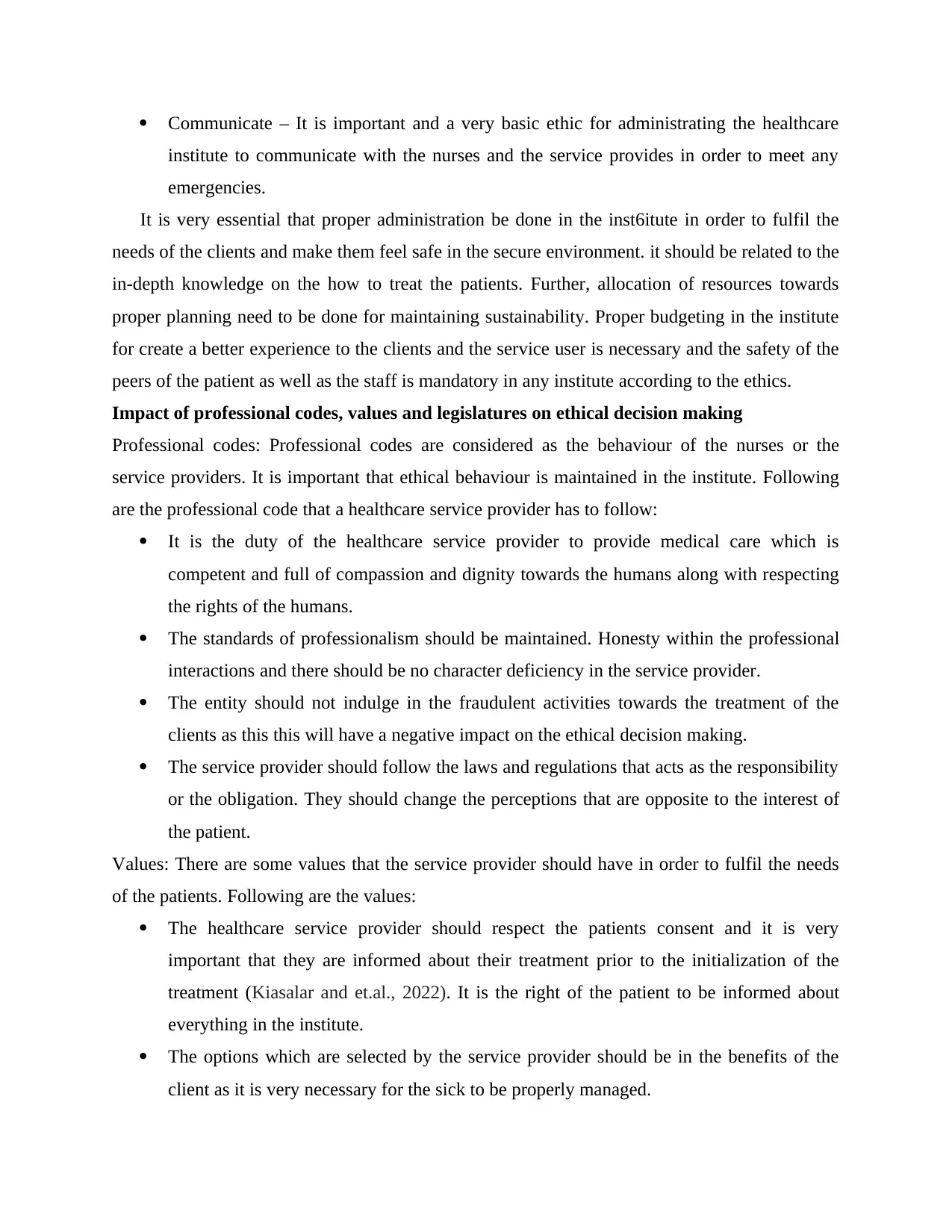
Communicate – It is important and a very basic ethic for administrating the healthcare
institute to communicate with the nurses and the service provides in order to meet any
emergencies.
It is very essential that proper administration be done in the inst6itute in order to fulfil the
needs of the clients and make them feel safe in the secure environment. it should be related to the
in-depth knowledge on the how to treat the patients. Further, allocation of resources towards
proper planning need to be done for maintaining sustainability. Proper budgeting in the institute
for create a better experience to the clients and the service user is necessary and the safety of the
peers of the patient as well as the staff is mandatory in any institute according to the ethics.
Impact of professional codes, values and legislatures on ethical decision making
Professional codes: Professional codes are considered as the behaviour of the nurses or the
service providers. It is important that ethical behaviour is maintained in the institute. Following
are the professional code that a healthcare service provider has to follow:
It is the duty of the healthcare service provider to provide medical care which is
competent and full of compassion and dignity towards the humans along with respecting
the rights of the humans.
The standards of professionalism should be maintained. Honesty within the professional
interactions and there should be no character deficiency in the service provider.
The entity should not indulge in the fraudulent activities towards the treatment of the
clients as this this will have a negative impact on the ethical decision making.
The service provider should follow the laws and regulations that acts as the responsibility
or the obligation. They should change the perceptions that are opposite to the interest of
the patient.
Values: There are some values that the service provider should have in order to fulfil the needs
of the patients. Following are the values:
The healthcare service provider should respect the patients consent and it is very
important that they are informed about their treatment prior to the initialization of the
treatment (Kiasalar and et.al., 2022). It is the right of the patient to be informed about
everything in the institute.
The options which are selected by the service provider should be in the benefits of the
client as it is very necessary for the sick to be properly managed.
institute to communicate with the nurses and the service provides in order to meet any
emergencies.
It is very essential that proper administration be done in the inst6itute in order to fulfil the
needs of the clients and make them feel safe in the secure environment. it should be related to the
in-depth knowledge on the how to treat the patients. Further, allocation of resources towards
proper planning need to be done for maintaining sustainability. Proper budgeting in the institute
for create a better experience to the clients and the service user is necessary and the safety of the
peers of the patient as well as the staff is mandatory in any institute according to the ethics.
Impact of professional codes, values and legislatures on ethical decision making
Professional codes: Professional codes are considered as the behaviour of the nurses or the
service providers. It is important that ethical behaviour is maintained in the institute. Following
are the professional code that a healthcare service provider has to follow:
It is the duty of the healthcare service provider to provide medical care which is
competent and full of compassion and dignity towards the humans along with respecting
the rights of the humans.
The standards of professionalism should be maintained. Honesty within the professional
interactions and there should be no character deficiency in the service provider.
The entity should not indulge in the fraudulent activities towards the treatment of the
clients as this this will have a negative impact on the ethical decision making.
The service provider should follow the laws and regulations that acts as the responsibility
or the obligation. They should change the perceptions that are opposite to the interest of
the patient.
Values: There are some values that the service provider should have in order to fulfil the needs
of the patients. Following are the values:
The healthcare service provider should respect the patients consent and it is very
important that they are informed about their treatment prior to the initialization of the
treatment (Kiasalar and et.al., 2022). It is the right of the patient to be informed about
everything in the institute.
The options which are selected by the service provider should be in the benefits of the
client as it is very necessary for the sick to be properly managed.
⊘ This is a preview!⊘
Do you want full access?
Subscribe today to unlock all pages.

Trusted by 1+ million students worldwide
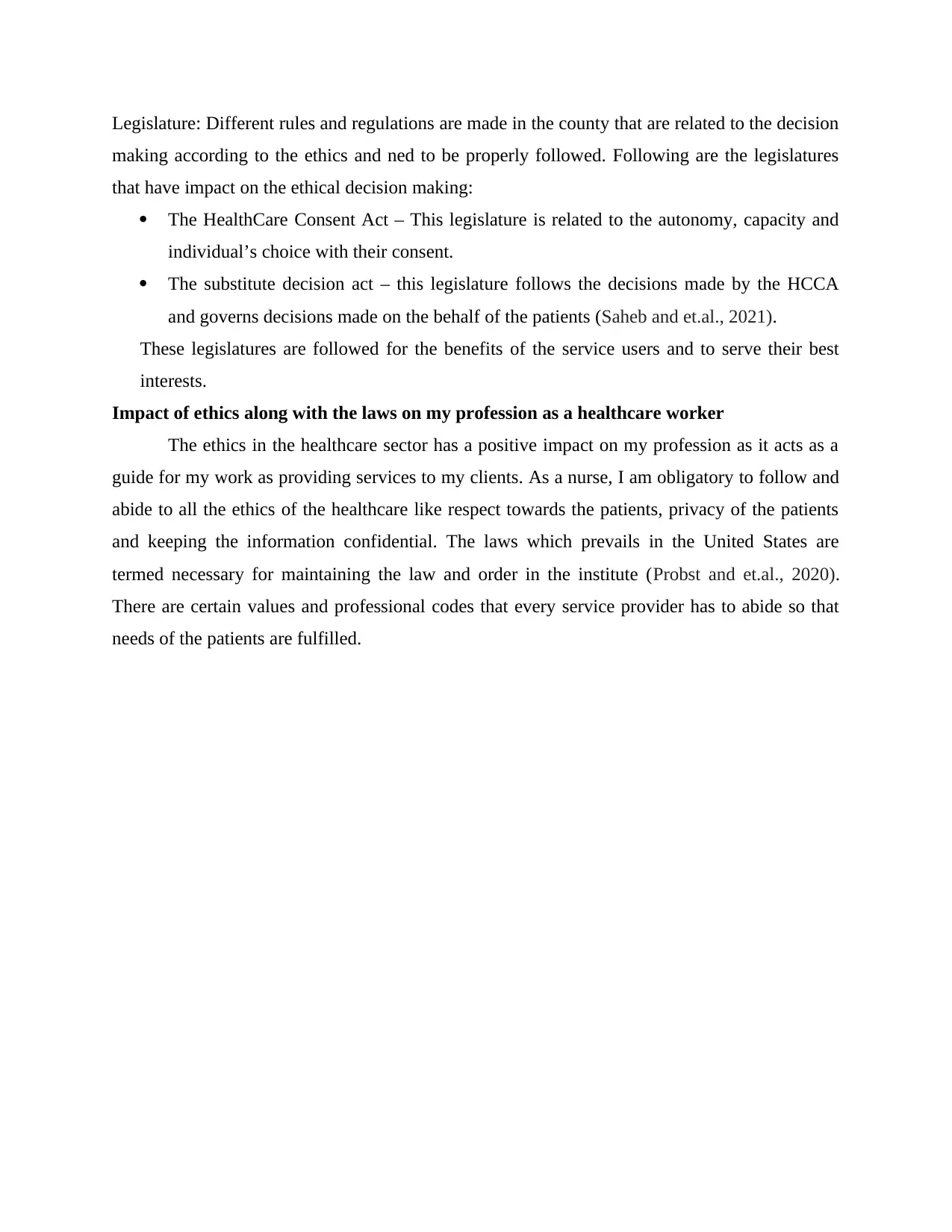
Legislature: Different rules and regulations are made in the county that are related to the decision
making according to the ethics and ned to be properly followed. Following are the legislatures
that have impact on the ethical decision making:
The HealthCare Consent Act – This legislature is related to the autonomy, capacity and
individual’s choice with their consent.
The substitute decision act – this legislature follows the decisions made by the HCCA
and governs decisions made on the behalf of the patients (Saheb and et.al., 2021).
These legislatures are followed for the benefits of the service users and to serve their best
interests.
Impact of ethics along with the laws on my profession as a healthcare worker
The ethics in the healthcare sector has a positive impact on my profession as it acts as a
guide for my work as providing services to my clients. As a nurse, I am obligatory to follow and
abide to all the ethics of the healthcare like respect towards the patients, privacy of the patients
and keeping the information confidential. The laws which prevails in the United States are
termed necessary for maintaining the law and order in the institute (Probst and et.al., 2020).
There are certain values and professional codes that every service provider has to abide so that
needs of the patients are fulfilled.
making according to the ethics and ned to be properly followed. Following are the legislatures
that have impact on the ethical decision making:
The HealthCare Consent Act – This legislature is related to the autonomy, capacity and
individual’s choice with their consent.
The substitute decision act – this legislature follows the decisions made by the HCCA
and governs decisions made on the behalf of the patients (Saheb and et.al., 2021).
These legislatures are followed for the benefits of the service users and to serve their best
interests.
Impact of ethics along with the laws on my profession as a healthcare worker
The ethics in the healthcare sector has a positive impact on my profession as it acts as a
guide for my work as providing services to my clients. As a nurse, I am obligatory to follow and
abide to all the ethics of the healthcare like respect towards the patients, privacy of the patients
and keeping the information confidential. The laws which prevails in the United States are
termed necessary for maintaining the law and order in the institute (Probst and et.al., 2020).
There are certain values and professional codes that every service provider has to abide so that
needs of the patients are fulfilled.
Paraphrase This Document
Need a fresh take? Get an instant paraphrase of this document with our AI Paraphraser
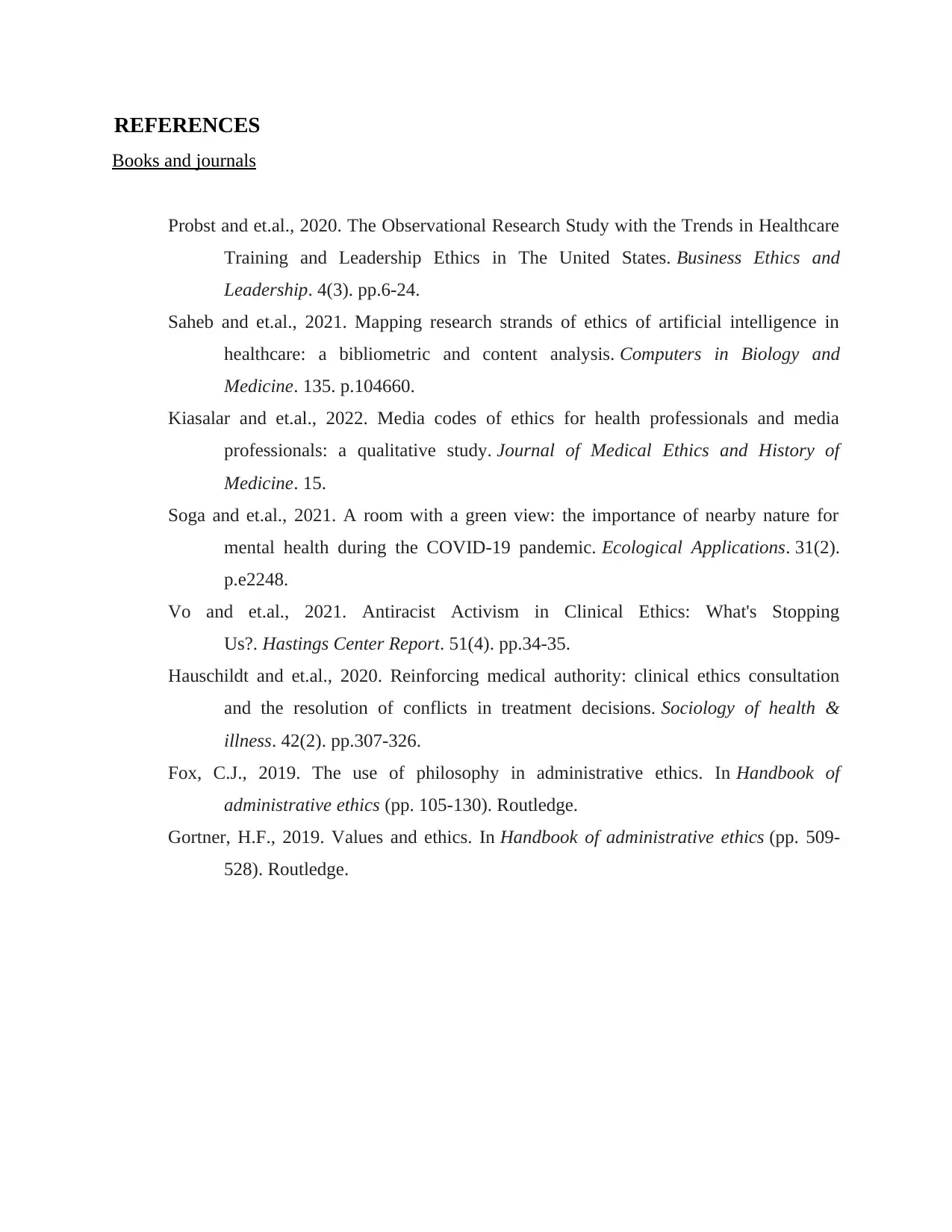
REFERENCES
Books and journals
Probst and et.al., 2020. The Observational Research Study with the Trends in Healthcare
Training and Leadership Ethics in The United States. Business Ethics and
Leadership. 4(3). pp.6-24.
Saheb and et.al., 2021. Mapping research strands of ethics of artificial intelligence in
healthcare: a bibliometric and content analysis. Computers in Biology and
Medicine. 135. p.104660.
Kiasalar and et.al., 2022. Media codes of ethics for health professionals and media
professionals: a qualitative study. Journal of Medical Ethics and History of
Medicine. 15.
Soga and et.al., 2021. A room with a green view: the importance of nearby nature for
mental health during the COVID‐19 pandemic. Ecological Applications. 31(2).
p.e2248.
Vo and et.al., 2021. Antiracist Activism in Clinical Ethics: What's Stopping
Us?. Hastings Center Report. 51(4). pp.34-35.
Hauschildt and et.al., 2020. Reinforcing medical authority: clinical ethics consultation
and the resolution of conflicts in treatment decisions. Sociology of health &
illness. 42(2). pp.307-326.
Fox, C.J., 2019. The use of philosophy in administrative ethics. In Handbook of
administrative ethics (pp. 105-130). Routledge.
Gortner, H.F., 2019. Values and ethics. In Handbook of administrative ethics (pp. 509-
528). Routledge.
Books and journals
Probst and et.al., 2020. The Observational Research Study with the Trends in Healthcare
Training and Leadership Ethics in The United States. Business Ethics and
Leadership. 4(3). pp.6-24.
Saheb and et.al., 2021. Mapping research strands of ethics of artificial intelligence in
healthcare: a bibliometric and content analysis. Computers in Biology and
Medicine. 135. p.104660.
Kiasalar and et.al., 2022. Media codes of ethics for health professionals and media
professionals: a qualitative study. Journal of Medical Ethics and History of
Medicine. 15.
Soga and et.al., 2021. A room with a green view: the importance of nearby nature for
mental health during the COVID‐19 pandemic. Ecological Applications. 31(2).
p.e2248.
Vo and et.al., 2021. Antiracist Activism in Clinical Ethics: What's Stopping
Us?. Hastings Center Report. 51(4). pp.34-35.
Hauschildt and et.al., 2020. Reinforcing medical authority: clinical ethics consultation
and the resolution of conflicts in treatment decisions. Sociology of health &
illness. 42(2). pp.307-326.
Fox, C.J., 2019. The use of philosophy in administrative ethics. In Handbook of
administrative ethics (pp. 105-130). Routledge.
Gortner, H.F., 2019. Values and ethics. In Handbook of administrative ethics (pp. 509-
528). Routledge.

2
⊘ This is a preview!⊘
Do you want full access?
Subscribe today to unlock all pages.

Trusted by 1+ million students worldwide
1 out of 9
Related Documents
Your All-in-One AI-Powered Toolkit for Academic Success.
+13062052269
info@desklib.com
Available 24*7 on WhatsApp / Email
![[object Object]](/_next/static/media/star-bottom.7253800d.svg)
Unlock your academic potential
Copyright © 2020–2025 A2Z Services. All Rights Reserved. Developed and managed by ZUCOL.




